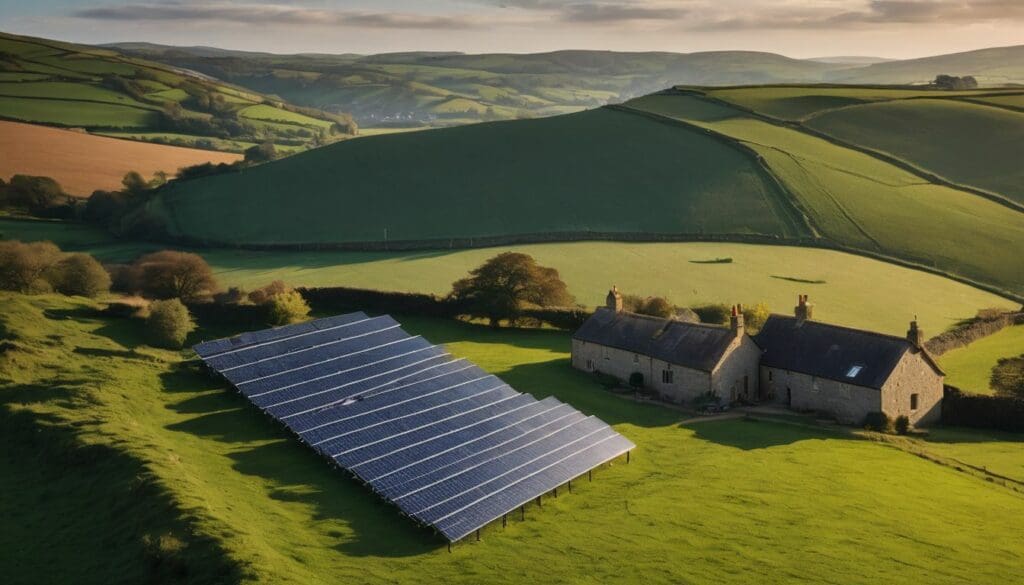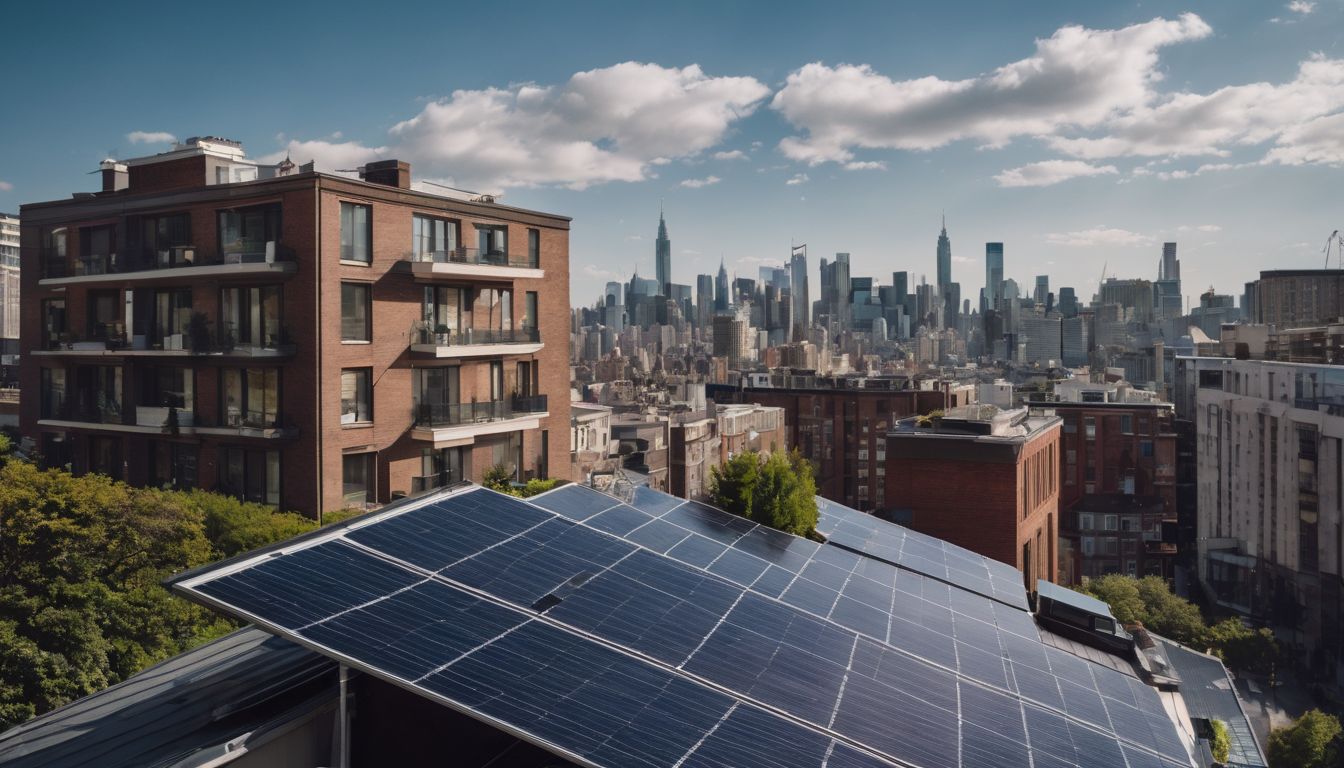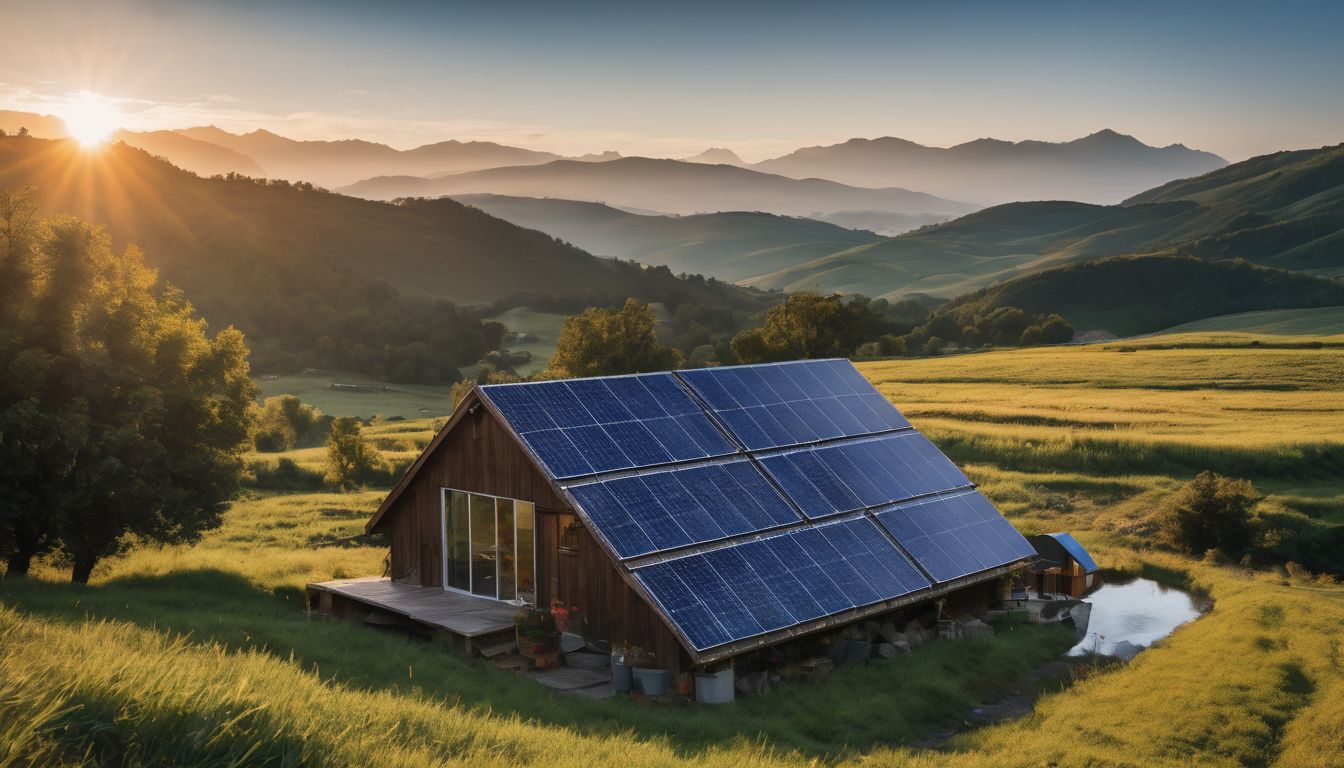Many of us wonder if solar energy works well in Britain’s cloudy weather. Despite the UK’s reputation for grey skies, it generated 13% of its renewable electricity from solar power in 2020.
This blog will explore how solar can thrive even under the UK clouds and what it means for our green future. Keep reading to discover if you could be part of this bright solution!
Key Takeaways
- The UK generated 13% of its renewable electricity from solar power in 2020, showing that even with cloudy weather, solar energy is a substantial and growing part of the country’s renewables mix.
- Solar panels don’t need direct sunlight to operate; they can still generate electricity efficiently on overcast days, which means households and businesses across the UK can benefit from solar technology despite the frequent grey skies.
- Government support through initiatives like the Feed – in Tariff, Smart Export Guarantee, and Contracts for Difference has been key in encouraging the adoption of solar energy within the UK.
- Technological improvements have led to more efficient solar panels that work better under less sunny conditions and integrate smoothly with other forms of renewable energy like wind and hydroelectric power.
- Climate change may impact weather patterns that affect sunlight availability for solar generation in the future. However, continued advancements in technology offer solutions to these challenges while contributing to a decrease in carbon emissions.
The Current State of Solar Energy in the UK
Solar power in the United Kingdom has seen substantial growth in recent years, with advancements in solar technology and increasing government support. The UK’s solar potential is promising and its installed capacity for solar PV generation continues to rise, contributing significantly to the country’s renewable energy targets.
Solar power in the United Kingdom
Across the United Kingdom, rooftops and fields are becoming increasingly dotted with photovoltaic panels. The nation has embraced solar energy, harnessing the sun’s rays even under its often cloudy skies.
Innovative solutions like building integrated photovoltaic technology have made it easier than ever for households and businesses to generate clean energy. Solar farms sprawl across hectares of land, quietly converting sunlight into electricity without emitting greenhouse gases.
Even in a climate known for grey weather, the UK makes significant strides in sustainable energy with solar power. Panels continue to operate efficiently on overcast days; they simply require light, not direct sunshine.
This adaptability contributes to a growing capacity for renewable energy generation throughout the country. House owners and industries alike benefit from this alternative energy source that helps cut down on utility bills and reduce reliance on fossil fuels.
Solar potential
The UK’s climate may not be known for its consistent sunshine, but the solar potential in the country is significant. Despite occasional cloud cover and rain, the UK still receives enough sunlight to make solar energy a viable renewable energy source.
With advancements in solar technology increasing efficiency and integration with other renewable energy sources, solar panels have become an increasingly attractive option even in less sunny climates like the UK.
As sustainable living gains traction, understanding the potential of solar energy can inspire environmentally conscious individuals to support conservation efforts and embrace clean energy sources for a greener future.
Solar PV installed capacity and generation
| Year | Installed Capacity (MW) | Electricity Generated (GWh) |
|---|---|---|
| 2019 | 13,300 | 13,000 |
| 2020 | 13,900 | 12,500 |
| 2021 | 14,500 | 13,300 |
Solar energy is transforming the UK’s power landscape. Solar photovoltaic (PV) panels dot rooftops and fields, harnessing sunlight to generate electricity. Here’s a snapshot of the installed capacity and generation figures for solar power in the UK:
As shown, solar PV capacity and electricity generation have shown an upward trend. Capacities have increased annually, reflecting a growing commitment to renewable energy. Electricity generation fluctuates, influenced by weather patterns and solar intensity each year. These figures represent the ascendant role of solar in the UK’s energy mix. Solar installations continue to play a key part in the nation’s shift towards a more sustainable future. Environmental enthusiasts recognise the progress, even as the UK’s climate poses unique challenges for solar efficiency. Every new solar panel contributes to cleaner energy, lower emissions, and a healthier planet.
History of solar energy in the UK
With solar PV installed capacity and generation on the rise in the UK, it’s vital to understand the history of solar energy in this region. The use of solar power dates back to the 19th century when photovoltaic technology was first discovered by Alexandre-Edmond Becquerel.
Fast forward to 1954, Bell Telephone Laboratories developed the first practical silicon solar cell. In more recent times, around 2010, with government support and technological advancements, solar energy gained popularity as a sustainable resource in the UK.
Moving towards understanding how sun-powered initiatives have evolved over time is crucial for assessing its future potential.
Government Initiatives and Programs
The UK government has implemented various initiatives and programs such as the Feed-in tariff, Smart Export Guarantee, and Contract for Difference to support the growth of solar energy.
To learn more about how these programs are driving the adoption of solar power in the UK, keep reading!
Feed-in tariff
The Feed-in Tariff programme, introduced by the UK government, enables households and businesses to generate their own renewable electricity. By installing solar panels or other eligible technologies, participants are paid for the electricity they generate, even if they use it themselves.
This initiative has been instrumental in encouraging the adoption of solar energy and reducing greenhouse gas emissions.
Furthermore, apart from providing financial incentives, the Feed-in Tariff scheme promotes long-term sustainability by empowering individuals and communities to contribute to the country’s renewable energy goals.
However, with recent policy changes shifting towards Smart Export Guarantee and Contract for Difference mechanisms, understanding these developments is crucial for maximising benefits from solar investment in the UK climate.
Advancements in solar technology have increased efficiency levels and improved integration with other renewable sources; this presents new opportunities for cost-effective clean energy generation.
Smart Export Guarantee
The Smart Export Guarantee (SEG) is a government program aimed at incentivising the production of renewable energy, including solar power. Under this scheme, households and businesses that generate their own electricity through solar panels can sell any excess energy they don’t use back to the grid.
This allows them to earn money for the electricity they produce, promoting further investment in solar technology and contributing to a more sustainable energy future in the UK.
The SEG provides an opportunity for individuals and businesses to not only reduce their carbon footprint but also benefit financially from their environmentally friendly practices.
By participating in this program, people can actively contribute to renewable energy generation while also reaping financial rewards, creating a win-win situation that supports both environmental conservation and economic sustainability.
Contract for Difference
Moving on from the Smart Export Guarantee, another government initiative to promote renewable energy is the Contract for Difference (CfD) scheme. This policy supports low-carbon electricity generation by providing direct contracts between renewable generators and the government.
The aim is to incentivise investment in renewable technologies by offering stable and predictable revenue streams over a long-term period, ensuring that environmentally conscious individuals can contribute to sustainable energy production with confidence.
Advancements in Solar Technology
– Solar technology has seen significant advancements in recent years, with increased efficiency and integration with other renewable energy sources. These advancements have contributed to the growth and potential of solar energy in the UK climate.
Increased efficiency
Solar technology has seen remarkable advancements in recent years, leading to increased efficiency in energy production. These improvements have made solar panels more effective at converting sunlight into electricity, making them a viable option for generating clean and sustainable energy.
The enhanced efficiency of solar panels means that they can now produce more power from the same amount of sunlight, ultimately increasing the overall output of solar energy systems.
This development is significant for environmentally conscious individuals seeking to reduce their carbon footprint and contribute to a greener future.
Integration with other renewable energy sources
Solar energy can be effectively integrated with other renewable energy sources in the UK, such as wind and hydroelectric power. By combining these sources, a more consistent and reliable energy supply can be achieved.
This integration allows for greater flexibility in meeting fluctuations in demand and ensures a more stable and sustainable energy generation system.
This combined approach also enhances the overall efficiency of the renewable energy sector and contributes to reducing carbon emissions, thus supporting the UK’s efforts to combat climate change.
As we look towards a future powered by diverse renewable resources, integrating solar energy with other renewables will play a crucial role in building a resilient and sustainable energy infrastructure.
The Impact of Climate Change on Solar Viability
Climate change is expected to affect the UK’s solar energy resource, potentially altering the amount of sunlight available for solar power generation. Understanding these changes is crucial for ensuring the long-term viability of solar energy in the UK.
The UK’s solar energy resource
The UK’s solar energy resource is plentiful, with the country receiving a surprising amount of sunlight despite its reputation for cloudy weather. The potential for solar power in the UK lies in its ability to harness this natural resource and convert it into clean energy.
With advancements in technology driving improved efficiency and integration with other renewable sources, solar energy stands as a promising solution towards sustainability and reducing carbon emissions.
Looking ahead, understanding the impact of climate change on solar viability becomes crucial. As climate change continues to alter weather patterns, it’s essential to recognise both the opportunities and challenges that lie ahead for leveraging this valuable energy resource.
Effects of climate change on solar energy production
Climate change poses a significant impact on solar energy production in the UK due to its influence on weather patterns and insolation levels. As average temperatures rise, there is an increased risk of extreme weather events such as storms and heavy rainfall, potentially impacting the efficiency and durability of solar panels.
Additionally, changes in cloud cover can affect the amount of sunlight reaching solar panels, leading to fluctuations in energy generation. The rising temperatures may also lead to an increase in energy demand for cooling systems, which could strain the power grid during peak times.
Furthermore, climate change may alter the overall distribution of available sunlight across different regions in the UK, requiring adjustments to existing solar infrastructure and planning for new installations.
These potential impacts highlight the need for ongoing research into adapting solar technology to changing environmental conditions while reinforcing efforts to mitigate climate change through sustainable practices.
The Future of Solar Energy in the UK
The future of solar energy in the UK holds great potential for growth, as advancements in technology and government support continue to drive its development. With its role in the energy transition, solar energy presents both challenges and opportunities for a sustainable future.
Potential for growth
Solar energy in the UK has significant potential for growth, offering promising prospects for environmentally conscious individuals. The increasing emphasis on renewable energy sources and ongoing advancements in solar technology are paving the way for substantial expansion.
With government policies supporting solar initiatives and the rising demand for sustainable solutions, there is a clear opportunity for further development of solar energy infrastructure across the UK.
As efforts to combat climate change gain momentum, the role of solar energy in diversifying the country’s energy mix becomes increasingly vital. The growing awareness of environmental conservation and a shift towards sustainable practices position solar power as an integral player in shaping the future of clean energy.
Role in the energy transition
Solar energy plays a crucial role in the UK’s transition to a more sustainable and renewable energy future. As a clean and abundant source of power, solar panels contribute to reducing greenhouse gas emissions and lessening reliance on traditional fossil fuels.
By harnessing the power of sunlight, solar energy helps to diversify the country’s energy mix, making it more resilient and environmentally friendly. Furthermore, as advancements in technology continue to drive down costs while increasing efficiency, solar power is poised to play an increasingly pivotal role in shaping the nation’s evolving energy landscape.
Transitioning towards a cleaner and more sustainable energy model requires active participation from both individuals and businesses. Embracing solar power not only reduces carbon footprints but also supports the collective effort towards combating climate change.
The integration of solar energy into the national grid underscores its significance as an indispensable component in achieving long-term environmental goals for generations to come.
Challenges and opportunities
Solar energy in the UK faces various challenges and opportunities. One challenge is the intermittency of sunlight due to the country’s weather patterns, which affects solar energy production.
However, advancements in energy storage technologies provide an opportunity to mitigate this challenge by storing excess energy for later use when sunlight is not available. Additionally, ongoing government support and incentives create opportunities for individuals and businesses to invest in solar technology, contributing to a more sustainable and eco-friendly future.
Another significant challenge is ensuring that solar infrastructure integrates seamlessly with existing power grids. This requires careful planning and investment in grid modernisation to accommodate increased solar capacity while maintaining stability and reliability.
On the other hand, technological advancements continue to reduce costs and improve efficiency, making solar energy a more viable option for meeting the UK’s growing energy demands sustainably.
Conclusion
In conclusion, the viability of solar energy in the UK climate is evident. Government initiatives and programs have supported its growth. Advancements in solar technology have increased efficiency and integration with other renewable energy sources.
The impact of climate change on solar viability offers challenges but also opportunities for future growth and a vital role in the energy transition.
FAQs
1. Can solar energy be effective in the UK weather?
Yes, solar panels still work effectively in the UK climate as they can collect energy even on cloudy days.
2. How does government policy support solar energy use in the UK?
The UK government implements policies that encourage homes and businesses to install solar panels by offering incentives for producing renewable energy.
3. Is it worth investing in solar panels if I live in an area with lots of rain and clouds?
Investing in solar panels is considered a wise choice because modern technology allows them to be highly efficient, even in areas with frequent rain and overcast conditions.
4. Will using solar energy help me save money on my electricity bills?
Switching to solar power can significantly cut your electricity bills since you’ll be generating your own energy from the sun instead of relying solely on the grid.





